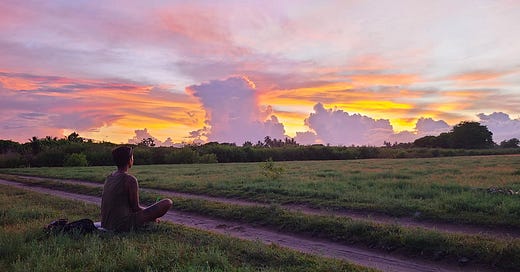Opinions expressed within the content are solely the author's and do not reflect the opinions and beliefs of any listed websites, their affiliates, any entity physical or otherwise, anything, anyone or any other form of matter that isn’t completely and uniquely, me.
28 February 2025
Puhpowee (verb)
Anishinaabe
“The force which causes mushrooms to push up from the earth overnight.”
When the whites came to take over the native American lands, the first thing they did was to remove their language. They had mouths washed out with soap, or worse, recounts Robin Wall Kimmerer in her book, Braiding Sweetgrass.
While we don’t consider being on earth colonialism, it kinda is.
She says, “to be native to a place we must learn to speak its language.”
We have lost the language of the planet, the sounds of earth, the guttural native utterances that make us belong here.
Who among us still speaks in terms of nature? How many among us look up to the heavens and see colours? Which industries protect, conserve, preserve our natural resources?
Instead, our language has changed to that of the colonial mindset – power, domination, wealth, and destruction. We look at the world around us through lenses blinded with dollar bills. Nothing has inherent worth unless we can sell it, exploit it, or increase our profits with it.
How many among us still look up to see the stars or spend time to watch the sunset? Not through our phones, not through screens, but through our nature eyes – the ones attuned to see so much beauty. How many have the time to stop, sit, and stare?
And even if we did how would our language describe it?
We only know names of what we know. We only name the familiar. We only relate to those with names. Everything else is irrelevant.
How many among us still put words to the whisps and curlicues of fluffy white clouds as we name them after familiar animals? Picking out rhinos and unicorns and funny looking chickens running, screaming across the gradients of azure blue.
That lost language only exists today through the imaginations of the little ones who still speak in bubbles and babbles, wide-eyed in mystery as they watch the world with wonder through their still innocent nature eyes. They’re speaking what we once spoke. There was a time we would have understood them. But now we attempt to make sense of them through our familiar – they must want something. Our eyes blinded with the language of necessity, of scarcity. But they’re just talking about the colours, the vibrations of sounds that they feel, and the warmth of someone’s touch.
The Little Prince by Antoine Saint-Exupery complained throughout the book that no big person understood his terrifying drawing of an elephant that was eaten by a snake. The adults thought it was a sombrero. Our adult language - dumbing down the wonder of the world. Our today words are not pretty enough for our planet.
We’re losing beauty through our loss of words. We’re losing beauty for convenience, for business, for being straightforward, direct, and blunt. For being quick. Instant gratification is erasing romance. A mismatch of letters, short forms, and slang are replacing the flourished words of poetry. Text message language, jargon, technical terms. We’ve belittled completely serendipitous magic into multi-syllabic easy to pronounce scientific words. Photosynthesis. Metamorphosis. Symbiosis.
Words are all we have. They form our perceptions and shape our behaviours and mould our thoughts. Yet we know so few. And we’re snuffing out more and more words from our vocabulary. We’re losing language, globally. The whole world speaks English as a lingua franca – the language used to colonise, to separate, label, and ‘other’.
But if English is what we’re all using, why don’t we use those words more effectively?
We don’t have to limit our language. We don’t have to replace nuances with speed. There are so many beautiful words in the English language. We can find them again. The more appreciative our words the more beautiful nature becomes.
Without word art, the sky is blue. The sunset is over. Night arrives.
But words have the power to create beauty.
Simple sentences are joined with adjectives and conjunctions to make a fluffy white cloud frolic with his fleecy friends. Trails of letters give texture, colour and vitality. The pinks and oranges blasted across the sky are met with metaphors of cotton candy swirls piled higgledy-piggledy in the funfair of the sky, along with the ferris wheel of lights that becomes the myriad of hues as the sun sets. And just around the corner, an orchestra of blues rise from the ocean up into the horizon before breaking up, staccato style, into a sneeze of cotton balls, strewn across the Paddle Pop coloured sky.
Words create connection. They connect us to memories of distant places and distant faces all through a literary description of a sound, a market, a kiss. We are transported into another time. Reflect on words and suddenly there’s a smile on our faces. Nothing physical has changed around us. Just the formation of sounds breathed through someone’s lips, or read, illegibly scribbled on paper. The synapses in our brains recalling a time now so long ago gone.
Words create imaginations. The more words we have the more radical, the more childlike, the more whimsical nature can become. We can start once again to speak the sounds of the planet. To look at the world around us through our nature eyes and describe it with the language we have but have lost.
Words and nature go hand in hand.
Pictures paint but words, they create.
What I can offer, HERE.
💌 Let’s talk: change@theecochapter.com
In service of our planet,
💚 Marla Lise, Earthling at The Eco Chapter





I agree: let’s save languages and the environments in which those languages bloomed. But even with English with can be ecocentric. We can even create new words to promote ecocentrism.